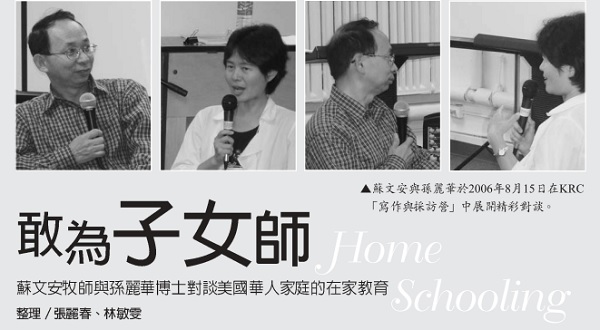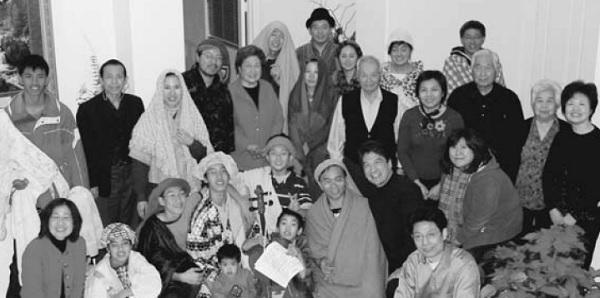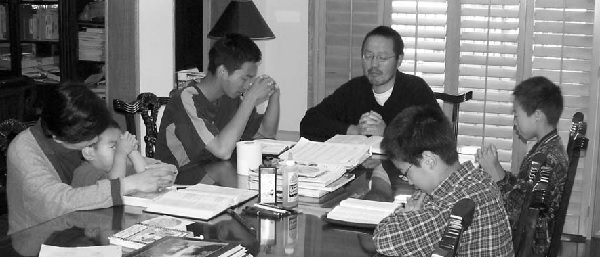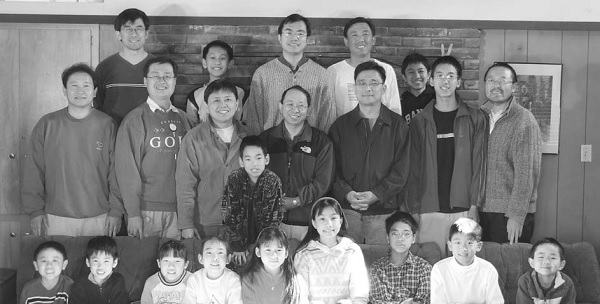Dare to be your children’s teacher
Pastor Wen'an Su and Dr. Lihua Sun discuss home education for Chinese families in the United States
Organized/Zhang Lichun, Lin Minwen

"Don't all Chinese families send their children to the best public schools?" Sun Lihua, a Ph.D. in education at Biola Christian University in California, was questioned by her professor when she set her thesis on Chinese home schooling in 2002.
After praying to seek God's will and getting confirmation from the interactions between teachers and friends, she set her sights and met and interviewed a number of Chinese Christian mothers through sampling methods over the past four years to explore their beliefs and cultural experiences in the process of home education. In the end, it snowballed into investigating as many as a hundred cases. The Chinese published many papers on home education in North America and Taiwan, and Lihua was the first to use mothers as the research object.(Except for this page, other pictures in this article were provided by "Weiwen Zhixin", a Chinese home education mutual aid group in Southern California in which Pastor Su and his family participate. We would like to express our gratitude.)
"I was born and raised here in the Chinese cultural tradition, and Lishan is a young international student and is familiar with American cultural traditions. We both hope to eliminate the unnecessary and retain the essential, integrate it, and then use biblical values as the core to manage marriage and marriage. family."
Pastor Su Wen'an, the editor-in-chief of this magazine, once recalled the family blueprint he and his wife Lishan drew when they first got married in the article "Wind and Kite" in the fourth issue of this magazine. Eight years ago, they started learning by doing and began the spiritual and moral building project of home education. Together with their three children, now 19, 15, and 8 years old, they learned to become people after God's heart.
In the 2006 Cultural Practice Camp, Pastor Zhongsu conducted an interview with Sister Sun Lihua on her research experience. Lihua has extensive and objective observation, while Pastor Su has profound subjective experience. When the two meet, it is more like a dialogue than an interview. The sparks created during the meeting are worthy of the attention and deep thought of readers who are exploring the feasibility of home education.

▲On Christmas Eve, parents and children, heart to heart, work together with the brothers and sisters in the church to tell the world the great news of the incarnation of Jesus.
Su: Why use mothers as the research object?
Sun:On Mother's Day in 2003, I sent e-cards to congratulate my friends who were mothers, and unexpectedly received an enthusiastic response, including from my supervisor. The message of the card is about the responsibilities God has given to mothers. Many mothers told me that even if their husbands are very busy and cannot fully share the responsibility of raising their children, they must live up to God’s commission and educate their children well, because this is a mission related to the kingdom of God. These reactions moved me very much and confirmed God’s guidance. After communicating with the professor, I narrowed the research topic to the personal growth of "Chinese mothers". Because usually mothers are the actual executors of home education and play an important role.
Sue: So, what exactly is the definition of “Home Schooling”? How should it be translated into Chinese?
Sun:Home education is an education method in which parents educate their children at home from kindergarten to twelfth grade instead of having their children attend formal schools.
Su: That is to say, it is not learning in an environment with campus, classrooms, principals, and teachers as in the traditional concept.
Sun:yes. As for Home Schooling, there are currently two translations: "home education" or "home learning".
Su: People who say "learning at home" do so because they emphasize that this is a learning process for both parents and children.
Sun:People who advocate "home education" believe that instead of moving the school home, education should be conducted in the family environment. For convenience, let’s use “home education” below!
Su: Generally speaking, when talking about home education, children’s social and peer issues will be mentioned immediately. What do the families you interact with in your research think?
Sun:A profound new concept I gained from these families is that socialization does not mean catering to others, but rather cultivating the family team to serve and become "servant leaders." They expect their children to become mainstays in society rather than blind followers. This requires children to be clear about their own values, have the courage to be like Daniel, and have the courage to express ideas that are different from those of their generation.

▲Su’s father (Xue Feng) leads the whole family in prayer to draw closer to the Lord every day. Even when traveling, he sends blessings and prayers over the phone.
Sue: Many people think that homeschooled children don’t have friends of the same age. In fact, healthy and normal social interaction is to be able to interact with people of different ages. Just being with friends of the same age, with similar judgments, values, and maturity, is not necessarily beneficial if you are confined to this secular and imitative subculture.
There are grandparents, parents, brothers and sisters who get along with each other in the family. In addition, they interact with other children who are educated at home. It is a combination of different ages. Therefore, the most special thing about home-schooled children is that they can get along with people of all ages, which is very different from the cynical teenagers in most middle schools.
Sun:Especially for Chinese immigrant families, it will help narrow the generation gap, cultural gap and language gap. In families with home education, parents, children and siblings spend a lot of time together, which invisibly creates a strong cohesion. According to my observation, children can feel that friends are temporary but siblings are eternal, which shocked me greatly.
Su: According to statistics, more than two million children in the United States currently receive home education, and the number is increasing at a rate of 15% every year. How many Chinese families are there among them?
Sun:The number has been increasing in the past twenty years. As far as I know, there are at least two hundred Chinese families. Nowadays, more and more young Chinese mothers include home education as a "worthy consideration" plan when their children are about to enter school.

▲A father-child retreat was held in early 2007, leaving unforgettable memories.
Su: Because there are already a considerable number of Chinese families practicing home education, mothers who care about their children’s education have the opportunity to access information in this area, and also have the experience of many people who have experienced it as a reference, so that they can measure its feasibility in a deeper and more specific way. So, what makes some families decide to start homeschooling?
Sun:I think it is the integration of faith and learning (Faith-Learning Integration). Many mothers responded that they initially refused home education, but God kept calling them to protect their children’s hearts through home education. After a long period of prayer and waiting, I answered this call.
There is a question in my questionnaire: "'Homeschooling is God's calling for me!' Are you sure about this statement? Scale your degree of certainty from 1 to 10." Many mothers chose 10.
When I asked them to use words and images to describe the process of deciding to homeschool, one mother used Jonah as a metaphor for herself. She wanted to escape God's call for about three years. It was not until she was "almost swallowed into the belly of a fish" that she obeyed God and started home education.
SOCRATES: Is there any other reason besides calling? For example, are you worried about the public school system and teaching materials?
Sun:These are of course included. Some mothers worry that moral standards in public schools are getting lower and lower, character building is lacking, and the Bible is being excluded. One mother mentioned that God allowed her to see magnificent schools and advanced facilities in her dreams. Once she opened the beautiful textbooks, they were filled with evil.
Some mothers think that teaching at school is a waste of time, so they would rather teach themselves. Of course, not every family has to wait until their children graduate from high school. Some mothers evaluate once a year to see if God wants them to continue.

▲"Come on! Look at our smiles as bright as the sun, you will know how wonderful the father-child retreat will be!"
Su: In other words, these families believe that according to the teachings of the Bible, faith and moral education are the responsibility of parents and should not be left to schools or even churches. The best way for parents to take responsibility is to become their children's teachers themselves.
So, what kind of family do you think is suitable for home education? What are the characteristics of these families?
Sun:Parents are ambitious and willing to grow up with their children. The spiritual life of the child is valued more than the academic performance. In such a family, the mother usually needs to stay at home full time, so the family's economic income will be greatly affected. But they are very willing to live with values that are different from the world, and they also know very well why they want to educate at home, so they can continue to do it if they are willing to pay the price.
Does anyone care whether the mother’s English skills should be good? Not really. Many mothers study with their children, using DVD teaching materials, watching and teaching with them. In fact, home education is about cultivating children's self-learning ability.
Su: There are other feasible methods, such as choosing some special courses at community colleges, or several families working together to give full play to their personal strengths, with one parent teaching mathematics and another teaching biology. Some people even turn their garages into experiments. room to teach chemistry. In addition to studying at home, several of our families in Southern California also have regular physical education, art, and moral training classes together every week.
What challenges do you think these families face? If someone drops out, what's the reason why they can't continue?
Sun:Some families reported that after entering high school, the difficulty of textbooks, experimental equipment, and children’s strong demands on their peers are all factors to consider.
But the first difficulty many families mention is the cultural ideology that "everything is inferior, only education is superior." If you can let go of this ideology, it will be easier to continue homeschooling. If you are afraid that others will know that you are homeschooling, it usually won't last long.
The "concern" of relatives, friends and elders can cause a lot of pressure. Others, such as the attitude of the church, whether the pastor supports it, and the opinions of church friends also have a great impact. Some people even use the term "church orphans" to describe home-schooling families. It can be seen that some home-schooling families are unable to integrate into the church circle and have formed their own small groups, which is an embarrassing situation.
Many teachers’ wives practice home education and strive to find a balance between serving. Homeschooling is also service, but no one can see it, so it is not accepted. There was once a teacher's wife who couldn't take care of both things at the same time, so she had to "ask for leave from the church" and was treated strangely. Examples like this are very heartbreaking.
Sue: Parents also face challenges when homeschooling. In a typical family, the adults go to work and the children go to school, so their time together is limited. When you are homeschooling, you are with your children almost all day long, and there is nothing to hide in the words and deeds of your parents. No wonder some people say that when home education is implemented, it is the parents who change the most.
Sun:Therefore, some parents believe that the first students in home education are the parents and the children are classmates.
Sue: This is a very interesting and relevant concept, that is, the whole family learns together. During these four years, are there any special scenes that moved you?
Sun:Too many! I even thought about making a documentary or writing a book about the information I collected. See the struggles of mothers, learn to say "I'm sorry" to their children, and let the children see the image of Jesus in their mothers.
A mother once had such an experience. One day, the thirteen-year-old second son and his five-year-old sister had a quarrel. She scolded him angrily: "Why are you so ignorant like a five-year-old child?"
Afterwards, she suddenly recalled the situation when her second child was five years old. The eldest son was seriously ill and hospitalized. She and the pastor needed to take care of her day and night, and she had to take care of the pastoral church. She had to leave the second son to relatives in other states to take care of her, which caused a rift between parent and child. Later, when there was a gathering of young people at home and the parents were busy serving, the child would watch the video by himself, letting the TV become his nanny. Therefore, compared to his younger sister, the second child's childhood was really blank.
The Holy Spirit's reminder made her see that she owed too much to Lao Er. She shed tears and sincerely apologized to the child. Since then, the relationship between the second child and her has been getting better and better. On last year's birthday, the second child got up early, prepared a hearty breakfast and brought it to his mother's bedside. Before going to bed at night, her son, who was already tall and strong, leaned over to hug and kiss him good night, making her feel that she was the happiest mother in the world.

▲Dad Zheng (self-cultivation, leftist) taught the anatomy, physiology and health care of the eyes, and introduced his career as an ophthalmologist.
Sue: Do you have any advice for families who are already homeschooling or are considering whether to homeschool?
Sun:First, we need to clarify why we want to educate at home. The advice from the mothers I know is: Be sure to understand that it is God’s leading and calling. Only with the right motivation can you persevere.
I also hope that the information collected in the paper can be helpful to families who will conduct home education in the future.
Su: What was your biggest gain during the interview process?
Sun:Getting to know these mothers, hearing their life testimonies, and seeing and participating in the growth of these families is my greatest reward. I am deeply grateful to God for allowing me to see the work of His hand in this era and to truly understand that God is real and living.
One mother interviewed believed that although the younger generation in the church have achieved good results in studies and careers, they are unable to be stable when it comes to interpersonal relationships and emotional issues, and are like duckweeds unable to take root. The Holy Spirit reminded her that this was the result of the parents' generation being too hands-off and allowing their children to develop on their own. She believes that home education represents the awakening of the parents’ generation and the rebuilding of a harmonious relationship with their children. Her words inspired me to understand the deeper meaning of home education. If God calls me in the future, I would also like to practice home education.
Su: When it comes to shaping children's faith and moral character, "home education" is only one of the ways, not the only one, nor the absolute one. However, from the many witnesses, we can see that this is a difficult but blessed road.
Although the eldest in our family has just entered college, and the second and third children are still around, everything has not yet settled, and it is not yet time to judge success or failure, but my wife and I are still willing to run towards the goal together.
Because we firmly believe that if we raise three children who are after God’s heart today, we will be able to build three families who are after God’s heart in the future, thereby cultivating groups of elite soldiers of the Kingdom of God. This is a heavenly undertaking worthy of our "sustainable management"!
———————-
Home Education Charging Station Classic Works
. Barfield, R. (2002). Real-life Home Schooling: the Stories of 21 Families Who Teach Their Children at Home. New York: Fireside.
. Farris, Vickie and Jayme. (2001). A Mom Just Like You: The Home Schooling Mother. Nashville, TN: Broadman & Holman.
. Macaulay, Susan Schaeffer. (1984). For the Children's Sake: Foundations of Education for Home & School. Wheaton, Illinois: Crossway Books & Bibles.
. Sproul, RC Jr. (2004). When You Rise Up: A Covenantal Approach to Homeschooling. Phillipsburg, NJ: R & R.
. Whelchel, L. (2003). So You're Thinking about Home Schooling: Fifteen Families Show How You Can Do It! Sisters, OR: Multnomah Publishers.
. Wise, Jessie & Susan Bauer (2004). The Well-Trained Mind: A Guide to Classical Education at Home. WW Norton & Company; Revised and Updated Edition.
———————
Home Education Charging Station Website
. RCCC Home Education Ministry (Ruoge Church Family Education Ministry) http://www.rccc.org/homeschooling/index.htm (The content includes practical information such as how to start home education for Chinese families in North America, frequently asked questions, etc.)
. Home Schooling Legal Defense Association (HSLDA) http://www.hslda.org/Default.asp?bhcp=1
. Advanced Training Institute (ATI) http://ati.iblp.org/ati/
. Institute in Basic Life Principles (IBLP) http://iblp.org/iblp
. Shao Tutorial Service http://shaoforum.net/tutorials/ (A Chinese teacher who graduated from home education, talks with students online, explains on the whiteboard, and teaches grammar, writing, Latin and other courses.)
. Yayi Book One website (has a column recommending home education books) http://asianbookone.com/store/index.php?cPath=142
The person in charge, Yao Yufangyuan, talks about his experience: "Why do we choose home education?" You can read it on the "Kingdom of God" website www.e-krc.org
. Muzhen Home Education Association http://homeschool.fhl.net/
. Taiwan Beiji Cultural and Educational Foundation http://tw.iblp.org/index.html
———————–
The Christian Fathers Arising profile that provided the photos for this article
Vision: “To turn the hearts of the fathers to their children, and the hearts of the children to their fathers.” (Malachi 4:6)
Members: 15 families in the greater Los Angeles area who practice home education, with 41 children currently.
Features: Home education is led and actively participated by the father.
Activities: There are painting, character education courses and baseball games every week; there are monthly prayer meetings for fathers and mothers; there are talent sharing every semester; there are parent-child retreats, camps, graduation ceremonies every year, and small lectures on truth, goodness and beauty are planned. .
Contact persons: Luo Shili, Yang Xuanzhi, Su Xuefeng (please refer to the email address of the mutual aid group on this page)
 Sun Lihua's profile
Sun Lihua's profile
I love reading, watching movies, and traveling. Former librarian and journalist. Studied cross-cultural pedagogy at Biola University in California and received a doctorate in the spring of 2007. Thesis title: Dare to Home School: Faith and Cultural Experience of Chinese Christian Mothers. If you are interested in this paper, please indicate and send it to: editor@e-krc.org, and it will be forwarded to Dr. Sun.
 Su Wen'an's profile
Su Wen'an's profile
A senior writer, writing, teaching, interviewing, and editing are both jobs and hobbies. He received a master's degree in missiology from Fuller Theological Seminary in California and a master of divinity from Taipei Theological Seminary. He is currently the vice president of the North American True Love Family Association.
